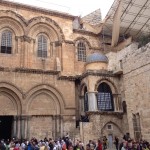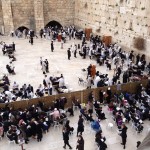Ahl al-Kitab in the Holy City
In this post, I want to speak to the concept of “ahl al-kitab,” or “People of the Book.” “People of the Book” refers to Christians, Muslims, and Jews. According to the Qur’an these people share commonality in that they have been selected by God to have been endowed with holy scripture through revelation to a prophet. The prophets preceding Muhammad, the last prophet, are recognized and revered in the Qur’anic revelation as brothers of Muhammad. Historically, where and when Islam has been hegemonic, People of the Book have been protected under the law. Because they are believed to have followed “paradigms of righteousness,” Christians and Jews have not been forced to convert to Islam and have benefited from the protection of Muslim armies under Islamic governance. Qur’anic verse 3.84 states, “We believe in God and what has been revealed to us and what was revealed to Abraham, Ismail, Isaac, Jacob, and the tribes, and in what was given toMoses, Jesus and the prophets from their Lord. We make no distinction between one and another among them and to Him (God) do we submit.”
Over Spring Break, I was lucky enough to visit Israel and the West Bank with the Harvard College Israel Trek. During the several days we spent in Jerusalem, I was able to see in the layers of the Old City the manner in which this city had been fought over, divided, destroyed, built up, and shared by the People of the Book. The Holy City, viewed from the Mount of Olives, holds the secrets, the triumphs, and the tribulations of these three peoples like nowhere else in the world. At once, I could hear the call to prayer from the local mosques, the church bells of the various Christian denominations, and the rhythmic prayers from the Western Wall. I hope you enjoy the following brief photographic exhibit composed of pictures I took during my time in Jerusalem. I hope they serve to collectively evoke the multilayered histories of the People of the Book.



